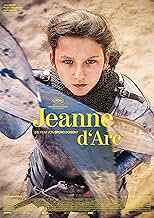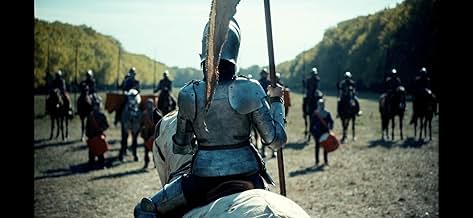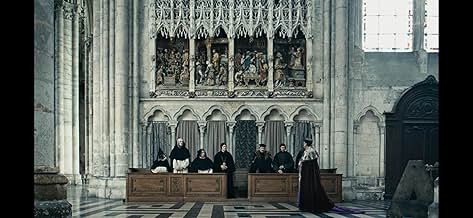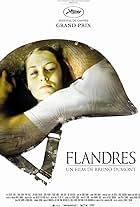In the 15th century, both France and England stake a blood claim for the French throne. Believing that God had chosen her, the young Joan (Lise Leplat Prudhomme) leads the army of the King o... Read allIn the 15th century, both France and England stake a blood claim for the French throne. Believing that God had chosen her, the young Joan (Lise Leplat Prudhomme) leads the army of the King of France. When she is captured, the Church sends her for trial on charges of heresy. Refus... Read allIn the 15th century, both France and England stake a blood claim for the French throne. Believing that God had chosen her, the young Joan (Lise Leplat Prudhomme) leads the army of the King of France. When she is captured, the Church sends her for trial on charges of heresy. Refusing to accept the accusations, the graceful Joan of Arc will stay true to her mission.
- Awards
- 2 wins & 8 nominations total
Featured reviews
Earlier films by Bruno Dumont had some experiments, but to this level, well, okay, we'll have to wait and watch. There is a predecessor to this film, which has the same approach, and the lead actor, which are unprofessional, but that's completely fine, if other ends are fulfilled. But lacking in that part, the film totally falls apart for me.
I found this film ultimately exasperating: not quite funny enough to be funny, or serious enough to be serious, or passionate enough to be about the passion of Joan of Arc. Dumont has produced such brilliant work in the past, and Joan of Arc could well have value as a way station to something else - a work in progress, a career evolution towards a new, tonally complex film-making language. But this film is opaque and unrewarding.
Even though Joan of Arc screened at the Cannes film festival, I don't find a point of passing this through the jury and if so, i don't see a valid reason behind this.
The production seemed tight in budget, the set design and even the actors, let's exclude the child actors the whole cast's acting died for me as they proceeded.
Even the cinematography was okay, probably, there was nothing outstanding in the film, for me.
The most famous story of our history,told,and told and told and TOLD.And filmed and filmed and filmed and FILMED :from Dreyer to Besson ,via De Mille , Preminger,Fleming,Bresson,and so many others it's impossible to count them all .
In "destinées" (1953),Jean Delannoy ,a director hated by the NV ,had sketched a new approach : it was only a sketch (about 40 min) but for the first time,it did not show Jeanne's epic but her moments of doubt and fear ,after the king was about to negociate and did not want to carry on with the fight.
"Jeanne" begins just before the siege of Paris ,the first of the heroine's failures .From the very beginning,one knows what to expect : not the usual scenes ,nothing spectacular ;if you're looking for this ,you'd better move on.
So much for the prelims : "this will be a defining moment" they all say ,before coming to the Parisians' rescue : her brothers in arms ,the duke of Alençon and Gilles De Rais (he's told :"you are not a sorcerer yet" ,an ominous line ");then heavenly voices which seem to sum up the epic for Joan is tired of the war and admits that she longs for the gentle way of life when she was spinning the wool .Then a very long scene which depicts movements in the horsemen which eventually produces a hypnotic effect .
Probably influenced by Bernard Shaw and Jean Anouilh,Dumont puts the stress on the supporting characters :hence the long discussion between the judges before the trial ,priding themselves on their degrees and on their high competence ; the trial takes place ,oddly ,in the cathedral of Rouen , which makes Joan all the more small and frail since the actress looks hardly like a teenager .This may be the only moment the viewer finds something to cling to ,for some of the lines are historically true (notably Jeanne's state of grace).Then again a threnody is heard ,sung by singer Christophe who wrote the music and appears here as preacher Guillaume Evrard -sadly Christophe was to pass away recently ,a victim of the covid 19.
The artistic choice is brought to the fore one more time in the final scenes : the torturers talk about their instruments ,and there's a pathetic quarrel about the prisoner's chain ;likewise , the guards of the dungeon show no compassion ,no desire (she's a witch and people were superstitious),and are more interested in the bottles of wine one of their mates bring:their derisory words are not unlike these of the warden in Jean Anouilh 's " Antigone" : it's not their business.
Defying historical realism , Jeanne 's jail looks like a WW2 bunker ; the audience is even refused the stake (Anouilh's "influence again :in "l'alouette" ,he had the stake destroyed) : only a small smoke ascends towards the absolute . It's not a very accessible film :but it possesses a mesmerizing fascinating power .
The casting is baffling. A 10 year old plays Jeanne, who was 19. The wonderful Fabrice Luchini, a man in his late 60's, plays King Charles, a man in his mid 20's. Apart from Luchini, most of the cast are dreadfully wooden. The camera work is perfunctory at best. The first 40 minutes is excruciatingly slow and shot mostly in sand dunes near the English Channel / La Manche. We are expected to suspend disbelief enough to imagine this variously represents the vicinity just outside Paris or in the garden of the Château de la Trémouille. A battle scene consists of about two dozen cast on horseback performing an equine dance routine. The dialogue appears to be straight from a play this film was based on. Exposition by announcing characters as we watch them trudge through the sand is amateurish beyond belief. The editor must have been high when this section of the film was cut. Incredibly long passages of nothing happening.
I gave up around the 35 minute mark, and a day later was about to write a review when I thought to be fair I should watch the movie in its entirety first and try to fathom how it achieved the awards it received. So I sat and watched the rest.
Around the 40 minute mark the locations shift to inside Amiens cathedral which provides some photographic interest and gradually the dialogue picks up. I assume the dialogue is from Jeanne's trial. Towards the end of the film, Jeanne's prison in Rouen is a WWII bunker in the middle of nowhere.
The budget for this film is supposedly EUR1,500,000. I can't see what it was spent on. The money would have been better spent shooting the stage play with no other pretensions.
'Cahiers du Cinéma' named Jeanne (Joan of Arc) the 5th best film of 2019. I assume they only saw 5 films. The French film industry is better than this.
This film has a certain look and feel which can be described as cheap and tedious. So don't bother with this one. You will only be exasperated that you wasted over 2 hours for nothing.
Storyline
Did you know
- TriviaThe French film magazine 'Cahiers du Cinéma' named Joan of Arc (2019) the 5th best film of 2019.
- ConnectionsFollows Jeannette: The Childhood of Joan of Arc (2017)
- How long is Joan of Arc?Powered by Alexa
Details
- Release date
- Country of origin
- Official site
- Language
- Also known as
- 聖女貞德再出征
- Filming locations
- Cathedral, Amiens, France(meeting between Jeanne and king and trial scenes)
- Production companies
- See more company credits at IMDbPro
Box office
- Budget
- €1,500,000 (estimated)
- Gross worldwide
- $195,699
- Runtime2 hours 17 minutes
- Color
- Aspect ratio
- 1.85 : 1
Contribute to this page


![Watch Bande-annonce [OV]](https://m.media-amazon.com/images/M/MV5BOWQwOWY2MDktMDExZS00ZDQ4LWE4Y2UtMWY4MjUwZTgyNzBhXkEyXkFqcGdeQXRyYW5zY29kZS13b3JrZmxvdw@@._V1_QL75_UX500_CR0,0,500,281_.jpg)



















